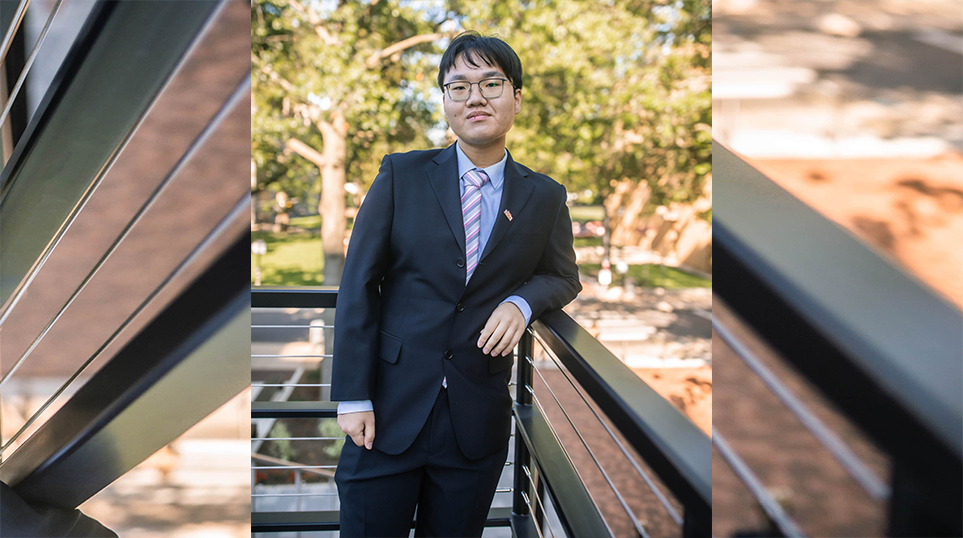Peter Yingzhe He is enrolled in the MPP+1 Accelerated Degree program. He currently serves as a Program Planning and Evaluation Intern with the Community Development & Regional Outreach Department at the Federal Reserve Bank of Philadelphia. Continue reading to learn more about his current position and experience in the accelerated degree program.
What is your current position and organization? What is the mission of your organization?
I serve as a Program Planning and Evaluation Intern, which is a year-round internship position at the Community Development & Reginal Outreach (CDRO) Department at the Federal Reserve Bank of Philadelphia (Philly Fed). I am in a transition process now with an expectation to work as a full-time professional in the Fed upon my graduation from the MPP program in May. The Philly Fed is one of the 12 regional Reserve Banks that, together with the Board of Governors in Washington, D.C., make up the Federal Reserve System. It helps formulate and implement monetary policy, supervises banks, savings, and loan holding companies, and provides financial services to depository institutions and the federal government. The Philly Fed serves eastern and central Pennsylvania, southern New Jersey, and Delaware. The CDRO Department, where I am interning now, is given the mission of working with low- and moderate-income communities and individuals to help increase their access to credit, quality jobs, education, and housing by partnering with intermediaries, conducting research, and convening stakeholders.
Please describe your position and what your day-to-day work looks like.
Working at the Fed can be a tricky topic to start a chit-chat. While the Fed always comes up with terms like money, interest rates, and inflation in public perception, my work is not necessarily about printing and counting money. Some of my primary duties in the office are to assist the outreach team in evaluating different Fed community programs, conduct regular outreach interviews with stakeholders across the industry to collect timely information on a micro basis, and plan public events related to regional economic recovery and growth. One major program I am working on is the Reinventing Our Communities (ROC) Cohort Program, an in-depth racial equity training program for cross-sector community groups across the U.S. to apply local solutions to increase opportunity and strengthen local economies. With various programs moving forward, every day is new for me at the Fed. Teamwork and communication skills are tied with the outreach work. The ability to travel across the country is a requirement in the office; I have even traveled once for a three-day conference in Cleveland as an intern.
How has the MPP+1 program been beneficial to your educational and/or career path?
While taking two different levels of classes back to my undergraduate semester was stressful, the outcome is fruitful. I was struggling to focus on a specific area during my political science undergrad study journey, but the Temple MPP+1 program has helped me to dive deeply into the policy world and equipped me with professional knowledge of developing a public policy from the ground. The courses offered by the program cover a broad range of topics that a policy professional would need to understand and use in the workplace, from policy analysis to real-life clients in the capstone project. I kept learning theories from the class, practicing them throughout my internship experiences, and reflecting on them when I went back to a new class.
Additionally, the irreplaceable network in Philadelphia offered by Temple MPP+1 has benefited me greatly, from academic learning to career path building. All MPP course instructors are simply the top experts in the industry from various entities; thus, the lectures are not merely about teaching but also a place for me to chat and learn about the trends and first-hand facts about the industry from these experts. I simply learned about the opportunity to intern at the Fed from Sam Porter, one of the MPP adjunct instructors, which now has become my career path.
How do you balance your workload with your coursework?
I was anxious about whether I was capable of balancing the workload with coursework at the beginning, but fortunately, the flexible work hours with a hybrid schedule at the Fed allowed me to save a tremendous amount of time from commuting. I always keep all deadlines and tasks from both work and study on one online calendar like Outlook, so I won't accidentally miss any of them while keeping track of my workflow. When big deadlines come, like the final term, I usually try to clean up a few days from my work schedule by finishing work tasks in advance and leaving the rest of the day for my course assignments. Talking to my supervisor and coworkers to see if they are able to take the lead on one of my projects during my final term has also helped me a lot to avoid being overwhelmed.
What was your favorite MPP class? Why?
Community Based Program Evaluation was one of my favorite MPP classes. I had just finished a comprehensive program evaluation by then, and the class's primary focus was introducing evaluation strategies for community-based programs, which allowed me to reflect on my work and compare it with the class theories. We read through different challenges encountered in conducting evaluations in applied settings, thought critically about possible solutions, and developed a simulant program at the end of the semester. The structured course streamlines my ability to design a program with an evaluation plan precisely and innovatively.

